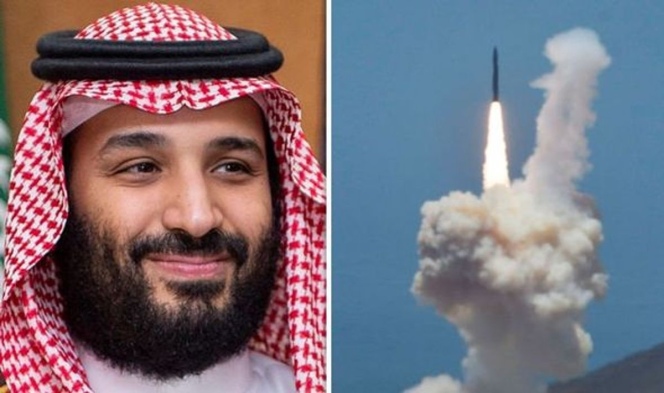
How the Saudis can fast-track a nuclear-weapons program
If I were them—and with Iran in mind—I would conclude that all the misbehavior that the Biden administration wants to punish me for would evaporate if I only had a nuclear-weapons program that I could use as leverage to extract whatever concessions I wish.
Eric R. Mandel(April 16, 2021 / JNS)
While the Biden administration offers sanctions relief to Tehran in exchange for temporarily limiting uranium enrichment to less than 20 percent, it is fulfilling another promise, to “recalibrate”—i.e., punish—longtime American ally Saudi Arabia. As the Saudis sustain Iranian-directed missile and drone attacks from Yemen and Iraq, the Biden administration chose to remove Patriot missile batteries from Saudi Arabia, as well as redeploy an aircraft carrier and surveillance systems away from the region. The clear message to Iran is: We will abandon our ally Saudi Arabia, your arch-enemy, if you will only rejoin the 2015 nuclear deal.
If I were the Saudis, I would conclude that all the misbehavior that the Biden administration wants to punish me for would evaporate if I only had a nuclear-weapons program that I could use as leverage to extract whatever concessions I wish from the Americans. I could do like the Iranians—threaten, intimidate and take over neighboring states—and be absolved if I would just slow down my nuclear-development program.
The Saudis might open their Rolodex and call Pakistan. According to the BBC, in 2013, “a senior NATO decision-maker … had seen intelligence reporting that nuclear weapons made in Pakistan on behalf of Saudi Arabia are now sitting ready for delivery.” This is the logical conclusion. The way we are headed, the Biden administration is about to start a nuclear arms race in the region with Egypt, the United Arab Emirates and Saudi Arabia, among others learning the lessons of the Iranian nuclear agreement. The formula is to develop a secret nuclear program, lie about it, engage in disruptive behavior and then trade some of that for a nuclear deal in your favor or foreign aid.
Saudi Arabia is no angel. The stain of the Sept. 11 terror attacks and the country’s exporting radical Sunni Islamist ideology in the late 20th century has ramifications that we live with to this day. ISIS was the worst permutation yet of radical Sunni ideology. But after 9/11, the Saudis turned a page and began to align more closely with American interests. In the 21st century, they have been a moderating and stabilizing force in Sunni Islam.
Their support of the Abraham Accords, which allowed the UAE, Bahrain, Sudan and Morocco to recognize Israel with diplomatic relations, is groundbreaking. Previous administrations did not even contemplate its possibility. If nurtured for regional stability, it is a path to suppress the Saudi need for a nuclear-weapons program. It also ended the fiction that the Israeli-Arab conflict needs to wait until the Israeli-Palestinian conflict ends. That is excellent news for those who believe Palestinian intransigence has been the roadblock to peace.
Instead of building on the game-changing Abraham Accords and pulling Saudi Arabia to the finish line by recognizing Israel, the Biden administration has chosen to make the Saudis a pariah, while begging the Iranian revolutionary regime to return to a deal that was created in their favor. As a reminder, it was created to give Iran international legitimacy for an industrial-size nuclear program within the decade. Stipulated within the nuclear agreement is Iran’s ability to buy an unlimited number of conventional weapons right now. No wonder that Supreme Leader Ayatollah Ali Khamenei allowed his minions to sign it.
Like the Obama team, the Biden administration still believes that you can appease Iran by acquiescing in their nuclear blackmail. Obama’s policy was to distance the United States from its Gulf state allies and Israel while ingratiating his administration with the Iranians, who have never ceased undermining U.S. security interests worldwide. The only good to come out of this mistaken policy is the increased willingness of the Saudis and others in the region to be friendlier to Israel as the only nation willing to take on the Iranians. This has been especially evident as Israel continues to impede Iran’s progress towards a nuclear weapon, most recently with its alleged attack this week on the Natanz enrichment facility.
Kowtowing to a third-rate military that supports terror sends a poor message to American allies around the world. The administration seems intent on settling for merely slowing down Iran’s quest for nuclear weapons while ignoring and, in effect, funding with sanctions relief the Islamic Republic’s decades-long worldwide campaign of terrorism. The false hope offered to the American people that the administration will be able to negotiate a new agreement dealing with Tehran’s malign activities after the resumption of a deal would be laughable if it were not so dangerous.
Hopefully, the administration will reflect on the potential consequences of its actions and change course to avoid turning the Middle East into a nuclear Wild West. The Saudis and the rest of the Sunni Muslim world are watching.
Dr. Eric R. Mandel is the director of MEPIN, the Middle East Political Information Network. He regularly briefs members of the U.S. Senate, House and their foreign-policy advisers. He is a columnist for “The Jerusalem Post” and a contributor to i24TV, “The Hill,” JTA and “The Forward.”
No comments:
Post a Comment